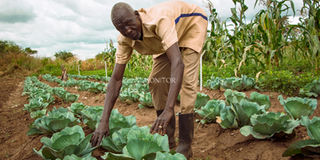Prime
Odyeny left the army for farming

Bosco Odyeny in his cabbage farm in Akadikum village in Otuke Town Council in Otuke District. PHOTOs | PRISCILLA MALOBA
What you need to know:
- Odyeny says he retired from the army in 1987 and joined farming where he has been getting money to pay school fees for his 11 children.
Many government servicemen ponder on what to do next after retiring from serving the country. However, Bosco Odyeny a resident of Akadikum village in Otuke Town Council in Otuke District, made a decision to start farming and like the saying goes, “enkumbi terimba”, he has never regretted taking this step.
Early days
Odyeny says he retired from the army in 1987 and joined farming where he has been getting money to pay school fees for his 11 children.
He says because he had no clear knowledge about farming, he started by using rudimentary tools on a small scale because he was afraid to make losses due to drought, pests and diseases. With time, he started attending trainings from agricultural institutions and improved his farming techniques.
The 63-year-old says when he was in the initial stages of farming, his community members used to mock him but as time went by, he now trains other farmers.
“I am the teacher of farmers in the whole village now mainly because I know every detail about farming like what to do when your crops have been affected by pests and diseases. So, whoever, has a problem with their crops comes to me,” Mr Odyeny says, adding that many agricultural organisations have come up to help farmers in his community but the one that has greatly impacted him is Sasakawa Africa Association (SAA) that he joined three years ago.
Sasakawa officials found him using a watering can to irrigate five acres where he was growing tomatoes and sweet potatoes.

Odyeny’s wife irrigates the cabbage garden with the treadle pump.
“It was not an easy job. But now I have a sprinkler. Sasakawa gave me a treadle pump, I expanded my garden and I can now plant any kind of crop and in any kind of season,” he says.
A simple solution
Treadle pumps are simple, human-powered devices that can be manufactured and maintained at low cost in rural workshops.
Unreliable rains is one of the main factors undermining crop production in Uganda. The effects of prolonged poor rainfall can lead to serious food shortages in the country.
Treadle pumps to smallholder farmers is Sasakawa’s intervention to encourage farmers produce crops under irrigation.
Odyeny was chosen due to his desire to become a modern farmer. On top of the pump, he was given improved tomato seeds called Padma, onions and a sachet of cabbage.
“They gave me good yield because they were of good quality and I followed good farming practices such as pruning, irrigation, spraying to kill pests and diseases while planting and even when they grew,” he says.
It is from here that he got funds that have helped him improve his life and constructing a permanent house.
Ms Christine Kyomugisha, the Sasakawa programme officer for regenerative agriculture says their main aim for aiding farmers is to increase farmers’ income, food productivity, food nutrition and food security through promoting market-oriented, sustainable, resilient and agricultural innovations.
“We are teaching farmers to practice regenerative agriculture because the climate is changing. There is a lot of soil degradation and other damages as impacts of climate change so we aim at teaching farmers to practice agriculture that is friendly to the environment,” Kyomugisha says.
Expansion
In 2016, Odyeny says, he bought pigs each at Shs100,000. He kept two piglets and sold the rest. In 2016, Odyeny says, he bought pigs each at Shs100,000. He kept two piglets and sold the rest. He kept selling until he obtained Shs1m which he used to buy a cow.
Sasakawa has continued used Odyeny as a model farmer and last season he received quick maturing bean seeds.
He sells potato vines to farmers in the community and has more than 100 customers and business is good. He has bought land worth shs4,500,000 in just two years.





